Share
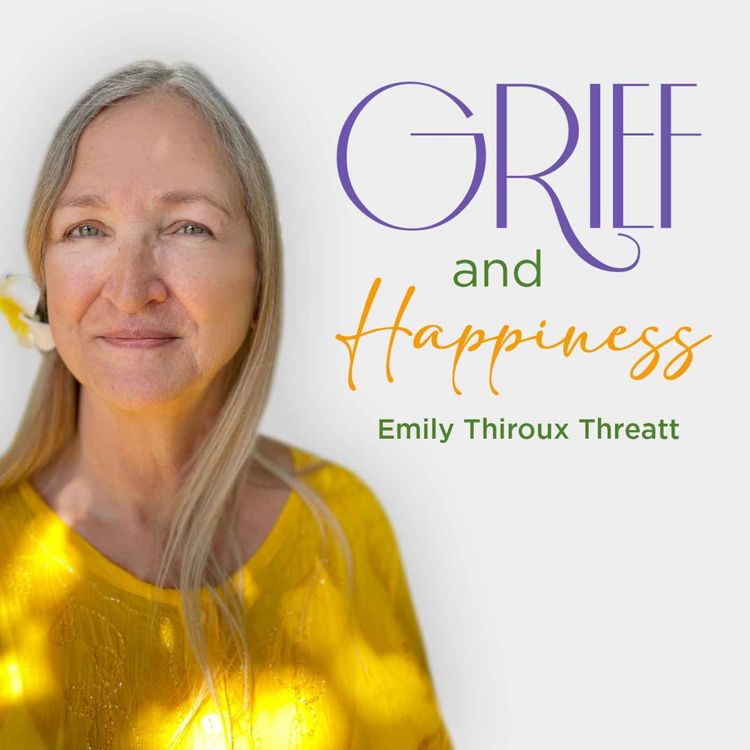
Grief & Happiness
Dealing with Loss and Grief in Prison with Dr. Fleet Maul
Dealing with grief and loss is more difficult while incarcerated because you get less support. Additionally, you have many restrictions on what you can do to deal with it.
In this episode, I am joined by Dr. Fleet Maul, an author, meditation teacher, consultant, and coach. He is the founder of Prison Mindfulness Institute, National Prison Hospice Association, Windhorse Seminars & Consulting, the Center for Contemplative End of Life Care at Naropa University, and co-founder of the Engaged Mindfulness Institute, Center for Mindfulness in Public Safety and the Upaya Zen Center's Buddhist Chaplaincy Training Program.
Throughout this episode, Dr. Fleet shares how he first got involved in the prison hospice program. You’ll also hear about the program's impact on the patients and volunteers. He also shares a personal story of loss and how meditation helped him to deal with grief.
Listen to episode 92 of Grief and Happiness to hear about the impact of Dr. Fleet’s prison hospice program!
In This Episode, You Will Learn:
- How Dr. Fleet got involved in prisoners' end-of-life care (01:45)
- How prison hospice programs work (06:43)
- Why Dr. Fleet started the prison hospice program (09:20)
- The major losses that Dr. Fleet has experienced in his life (13:35)
Resources
- Book - Radical Responsibility: How to Move Beyond Blame, Fearlessly Live Your Highest Purpose, and Become an Unstoppable Force for Good
- Book - Dharma in Hell: The Prison Writings of Fleet Maull
- Book - The Resilient C.O.: Neuroscience Informed Mindfulness-Based Wellness & Resiliency (MBWR) for Corrections Professionals
Connect with Dr. Fleet
Let's Connect:
- Website
- The Grief and Happiness Alliance
- Book: Emily Thiroux Threatt - Loving and Living Your Way Through Grief
More episodes
View all episodes
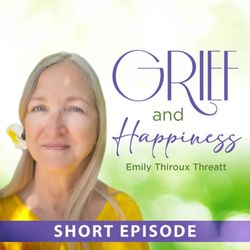
407. Unwritten
04:52||Ep. 407Let's Connect:You can join the Grief and Happiness Alliance which meets weekly on Sundays by clicking hereYou can order the International Best Selling The Grief and Happiness Guide by clicking here.You can order Loving and Living Your Way Through Grief by clicking here at Amazon:You can listen to my podcast, Grief and Happiness, by clicking hereRequest your Awaken Your Happiness Journaling Guide hereSee acast.com/privacy for privacy and opt-out information.
406. 1 in 3 Siblings Never Speak Again After a Parent Dies — Inherited Property Expert on How to Prevent It
41:08||Ep. 406If you've ever worried about what happens to your family when a loved one passes, episode 406 of the Grief and Happiness podcast is essential listening. Inherited property expert Alexa Rosario reveals why 1 in 3 siblings never speak again after going through the inheritance process — and shares the framework she built after losing her own father to help families protect both their legacy and their relationships.In This Episode, You Will Learn:(00:58) Alexa's story: losing her father and the probate nightmare (04:56) Why inherited property is never logical — and attachment styles (10:12) The four "power vacuums" that open when a parent dies (15:02) How to start legacy conversations without the death talk (15:28) Why recipes and traditions are the real inheritance (20:50) Storyworth: capturing a loved one's memories (23:27) Discovering hidden family history through love letters (28:36) Inside Heirloom: from closure to legacy coronation (34:43) How to access Heirloom and find a trained agentAlexa Rosario is a South Florida-based real estate professional and founder of Heirloom, a platform that helps families navigate inherited property and senior transitions with both emotional intelligence and logistical precision. Licensed since 2013, it was the sudden loss of her father in 2018 — followed by a grueling probate process and the loss of her grandmother less than a year later — that set her on a mission to transform the way America inherits property. Her work has been featured in Yahoo Finance, Women of Influence, and SFBW, and she is actively training agents across the country to bring Heirloom's heart-led approach to more families nationwide.In this episode, Alexa and Emily explore what Alexa calls "the long grief" — the emotional and logistical weight that descends on families after a loved one passes. Alexa introduces four "power vacuums" that open during inheritance: the provision vacuum (financial systems that vanish with the person who managed them), the soul vacuum (loss of the family's tradition-keeper), the legacy vacuum (loss of the person who gave the family its identity), and the secrets vacuum (revelations that surface after someone is gone). She also connects attachment styles to sibling conflict during grief, and shares her six-part Estate Transition Framework — moving families from emotional closure through curation and the property decision, to a final "coronation" that helps carry traditions forward — all rooted in her belief that the true inheritance is never the property, but the memories and identity passed from one generation to the next.Connect with Alexa Rosario:WebsiteSubstackInstagramLinkedInBook: Alexa Rosario - The Legacy YearLet's Connect: WebsiteLinkedInFacebookInstagramTwitterPinterestThe Grief and Happiness AllianceBook: Emily Thiroux Threatt - Loving and Living Your Way Through Grief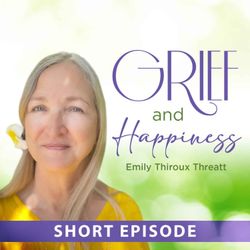
405. Who is Your Ohana?
04:30||Ep. 405Let's Connect:You can join the Grief and Happiness Alliance which meets weekly on Sundays by clicking hereYou can order the International Best Selling The Grief and Happiness Guide by clicking here.You can order Loving and Living Your Way Through Grief by clicking here at Amazon:You can listen to my podcast, Grief and Happiness, by clicking hereRequest your Awaken Your Happiness Journaling Guide hereSee acast.com/privacy for privacy and opt-out information.
404. Wholeness Is Your Birthright, Says Author Harper A. Bailey: Stop Searching for What You Already Have
41:20||Ep. 404If you've ever felt broken by grief or wondered if healing is truly possible, episode 404 of Grief and Happiness is for you. Author Harper A. Bailey shares the two words a hospice nurse whispered at her mother's bedside—"no regrets"—that took nine years in "the wilderness" of grief to understand. Through her lifelong journaling practice, Harper reveals why wholeness isn't something you search for—it's your birthright, waiting to be reclaimed. Her message will shift how you see grief, forgiveness, and healing.In This Episode, You Will Learn:(01:15) Harper's mission as a storyteller and her journey to wholeness(02:36) The four parts of her story: running, falling, sinking, and flying(03:30) Nine years in "the wilderness" after her mother's death(07:07) Accessible journaling methods: voice notes, junk journaling, and more(09:04) Why healing in community matters—isolation versus connection(12:52) How storytelling gives others permission to come home to themselves(16:31) Metabolizing grief: why you have to work through it, not around it(22:12) The boulder we carry: releasing trauma through writing(25:28) Forgiveness misconceptions—it's not letting others off the hook(27:41) "No regrets": the hospice nurse's message that changed everything(30:56) The power of 52 weekly cards: writing as an act of love(38:04) Small acts of kindness create ripple effects in grief(39:08) Why smiling and grief can—and should—coexistHarper A. Bailey is a Chicago native, public health leader, storyteller, and debut author whose raw and inspiring memoir It Was Her (October 2024) chronicles her journey through grief following her mother's death 13 years ago. A lifelong journalist since age nine who still keeps all her journals, Harper's work bridges personal transformation with public health as she helps people reclaim their wholeness. Her book unfolds in four parts—running, falling, sinking, and flying—revealing how she navigated nine years in "the wilderness" of grief before discovering the transformative power of journaling, forgiveness, and healing in community.In this episode, Harper shares her powerful message that grief comes in many forms—from loss of loved ones to job disappointments and "micro griefs"—and that metabolizing grief through confrontation rather than avoidance is essential to experiencing the present. She advocates for accessible journaling methods including traditional writing, voice notes, and junk journaling, emphasizing that this practice helps move what's inside out and creates space for healing. Central to her philosophy is the belief that wholeness is our birthright: we're not broken, but rather need to reclaim what already belongs to us through storytelling, forgiveness of self and others, and authentic connection in community. Harper reminds us that while we can't always choose our experiences, we can take control today and come home to ourselves.Connect with Harper A. Bailey:WebsiteFacebookInstagramBook: Harper A. Bailey - It Was Her: A MemoirLet's Connect: WebsiteLinkedInFacebookInstagramTwitterPinterestThe Grief and Happiness AllianceBook: Emily Thiroux Threatt - Loving and Living Your Way Through Grief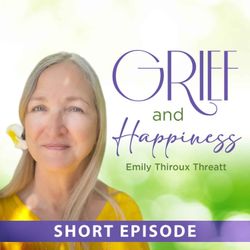
403. Writing Through Trauma
05:27||Ep. 403Writing can be the best thing you can do for self-care when you are dealing with trauma.Let's Connect:You can join the Grief and Happiness Alliance which meets weekly on Sundays by clicking hereYou can order the International Best Selling The Grief and Happiness Guide by clicking here.You can order Loving and Living Your Way Through Grief by clicking here at Amazon:You can listen to my podcast, Grief and Happiness, by clicking hereRequest your Awaken Your Happiness Journaling Guide hereSee acast.com/privacy for privacy and opt-out information.
402. Anticipatory Grief, Aftershocks, and ‘Mature Grief’: A Grief Educator Explains the Arc of Loss
33:44||Ep. 402If you’ve ever wondered what truly helps someone in grief, episode 402 of Grief and Happiness is for you. Mindset coach and certified grief educator Kathleen Quinn shares how losing her husband during COVID reshaped her view of grief as something we live with, not move past. Through moments like freezing in a grocery store parking lot and the power of saying a loved one’s name, she shows why presence matters more than words.In This Episode, You Will Learn:(00:55) How loss led Kathleen Quinn to grief education(03:46) Why grief doesn’t end—and how we live with it(04:40) Why saying the person’s name matters(06:50) Questions that help grievers feel seen(08:57) Losing a spouse during COVID and anticipatory grief(12:10) Finding purpose after profound loss(15:07) Why listening matters more than fixing(17:50) The arc of grief: anticipatory to mature(19:30) Why capable people freeze in early grief(22:16) How journaling supports healing over timeKathleen Quinn is a mindset coach, grief educator, and speaker based in Madison, Wisconsin. With more than 30 years of experience in university leadership and development, she brings deep listening skills and a grounded, compassionate approach to her work. After losing her husband during the height of the COVID pandemic, Kathleen became a certified grief educator through training with renowned grief expert David Kessler, integrating grief literacy into her coaching practice. Today, she helps individuals navigate loss, life transitions, boundaries, and self-worth with clarity, presence, and humanity.In Episode 402, Kathleen offers a thoughtful and deeply human perspective on grief, shaped by both personal loss and professional experience. She reframes grief as something we learn to live with rather than “move on” from, emphasizing the importance of presence, listening, and naming those who have died. Kathleen introduces key ideas such as grief literacy, secondary losses, and the natural arc of grief—from anticipatory grief to a stage where love outweighs pain. Through practical examples, she shows how small, intentional acts of listening and asking better questions can help grieving people feel truly seen and supported, reminding listeners that compassion often matters more than words.Connect with Kathleen Quinn:WebsiteLinkedInLet's Connect: WebsiteLinkedInFacebookInstagramTwitterPinterestThe Grief and Happiness AllianceBook: Emily Thiroux Threatt - Loving and Living Your Way Through Grief
401. Playing
03:51||Ep. 401Playing is an important component of your life at any age.Let's Connect:You can join the Grief and Happiness Alliance which meets weekly on Sundays by clicking hereYou can order the International Best Selling The Grief and Happiness Guide by clicking here.You can order Loving and Living Your Way Through Grief by clicking here at Amazon:You can listen to my podcast, Grief and Happiness, by clicking hereRequest your Awaken Your Happiness Journaling Guide hereSee acast.com/privacy for privacy and opt-out information.
400. From Dialysis Nights to Gallery Lights: How One Widow Turned Loss Into a New Creative Life
36:17||Ep. 400If you’ve ever wondered how loss can open the door to unexpected purpose, episode 400 of the Grief and Happiness podcast is for you. Artist and author Marcie Shrewsbury Lopez shares how caring for her husband through his final days—and facing the grief that followed—sparked a powerful new creative chapter. From unexpected signs on the beach to the healing pull of art and animals, Marcie shows how even deep sorrow can guide you toward meaning and renewal.In This Episode, You Will Learn:(01:07) Rebuilding life through art, friends, and horses(01:57) How horses create emotional breakthroughs in grief(03:45) The equine-therapy moment that unlocked years of tears(06:13) Why art helps access and heal deeper emotions(07:41) The dream, the meeting, and the love story that changed everything(16:06) How a 46-year age difference led to a joyful, adventurous marriage(23:00) The sacred lessons she learned while caregiving(26:06) The beach signs that continue to comfort her(27:10) How grief opened the door to her strongest creative work yetMarcie Shrewsbury Lopez is an artist, author, and storyteller whose work explores love, loss, and transformation. After the passing of her husband Adrian, she stepped more fully into her creative path, developing a body of artwork that reflects deep emotional truth. Her paintings have been featured in exhibitions across New Jersey, and her memoir shares the remarkable love story and spiritual journey that shaped her life. Marcie continues to inspire others through her art, writing, and the meaningful connections she builds around grief and healing.In this episode, Marcie reflects on the profound impact of her 20–year marriage and the ways grief opened new doors to healing. She shares how reconnecting with horses offered unexpected comfort, emotional release, and a grounding presence during mourning, and how her art became a powerful way to access and process her feelings. Marcie also recounts the extraordinary way she met and married Adrian, their life of adventure and unconditional love, and the sacred experience of caregiving at the end of his life. Her insights highlight how creativity, animals, spiritual signs, and continued bonds can gently guide us forward after loss.Connect with Marcie Shrewsbury Lopez:WebsiteBook: Marcie Shrewsbury Lopez - A PLACE OF PROMISELet's Connect: WebsiteLinkedInFacebookInstagramTwitterPinterestThe Grief and Happiness AllianceBook: Emily Thiroux Threatt - Loving and Living Your Way Through Grief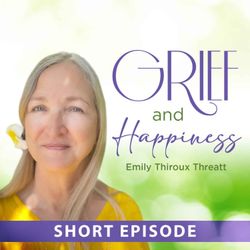
399. New Year New You
06:16||Ep. 399What one intention are you making for this year? Start it with the words: “I am.”Let's Connect:You can join the Grief and Happiness Alliance which meets weekly on Sundays by clicking hereYou can order the International Best Selling The Grief and Happiness Guide by clicking here.You can order Loving and Living Your Way Through Grief by clicking here at Amazon:You can listen to my podcast, Grief and Happiness, by clicking hereRequest your Awaken Your Happiness Journaling Guide hereSee acast.com/privacy for privacy and opt-out information.